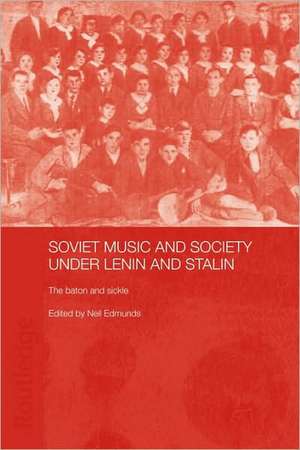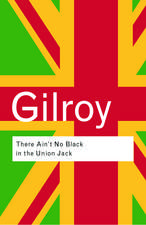Soviet Music and Society under Lenin and Stalin: The Baton and Sickle: BASEES/Routledge Series on Russian and East European Studies
Editat de Neil Edmundsen Limba Engleză Paperback – 14 aug 2009
| Toate formatele și edițiile | Preț | Express |
|---|---|---|
| Paperback (1) | 382.79 lei 6-8 săpt. | |
| Taylor & Francis – 14 aug 2009 | 382.79 lei 6-8 săpt. | |
| Hardback (1) | 1004.20 lei 6-8 săpt. | |
| Taylor & Francis – 27 mai 2004 | 1004.20 lei 6-8 săpt. |
Din seria BASEES/Routledge Series on Russian and East European Studies
-
 Preț: 228.19 lei
Preț: 228.19 lei -
 Preț: 311.22 lei
Preț: 311.22 lei - 8%
 Preț: 389.69 lei
Preț: 389.69 lei -
 Preț: 737.43 lei
Preț: 737.43 lei -
 Preț: 309.89 lei
Preț: 309.89 lei -
 Preț: 310.22 lei
Preț: 310.22 lei -
 Preț: 297.39 lei
Preț: 297.39 lei -
 Preț: 326.49 lei
Preț: 326.49 lei -
 Preț: 349.09 lei
Preț: 349.09 lei - 9%
 Preț: 1038.51 lei
Preț: 1038.51 lei - 24%
 Preț: 298.10 lei
Preț: 298.10 lei -
 Preț: 398.18 lei
Preț: 398.18 lei - 18%
 Preț: 1271.75 lei
Preț: 1271.75 lei - 18%
 Preț: 1057.05 lei
Preț: 1057.05 lei - 18%
 Preț: 1059.84 lei
Preț: 1059.84 lei - 18%
 Preț: 1062.26 lei
Preț: 1062.26 lei - 18%
 Preț: 1055.51 lei
Preț: 1055.51 lei - 18%
 Preț: 1057.75 lei
Preț: 1057.75 lei - 18%
 Preț: 1059.84 lei
Preț: 1059.84 lei - 25%
 Preț: 823.63 lei
Preț: 823.63 lei -
 Preț: 487.75 lei
Preț: 487.75 lei - 18%
 Preț: 1005.39 lei
Preț: 1005.39 lei - 18%
 Preț: 1000.76 lei
Preț: 1000.76 lei - 18%
 Preț: 1059.84 lei
Preț: 1059.84 lei - 18%
 Preț: 1059.84 lei
Preț: 1059.84 lei - 18%
 Preț: 1009.21 lei
Preț: 1009.21 lei - 18%
 Preț: 1059.84 lei
Preț: 1059.84 lei - 18%
 Preț: 1167.36 lei
Preț: 1167.36 lei - 18%
 Preț: 1060.87 lei
Preț: 1060.87 lei - 30%
 Preț: 771.71 lei
Preț: 771.71 lei - 18%
 Preț: 1059.84 lei
Preț: 1059.84 lei - 18%
 Preț: 1004.20 lei
Preț: 1004.20 lei - 18%
 Preț: 1053.92 lei
Preț: 1053.92 lei - 25%
 Preț: 515.72 lei
Preț: 515.72 lei - 18%
 Preț: 709.01 lei
Preț: 709.01 lei - 25%
 Preț: 823.08 lei
Preț: 823.08 lei - 18%
 Preț: 1103.19 lei
Preț: 1103.19 lei - 18%
 Preț: 1057.75 lei
Preț: 1057.75 lei - 18%
 Preț: 1065.75 lei
Preț: 1065.75 lei - 18%
 Preț: 1055.51 lei
Preț: 1055.51 lei - 26%
 Preț: 850.73 lei
Preț: 850.73 lei - 25%
 Preț: 825.06 lei
Preț: 825.06 lei - 18%
 Preț: 734.50 lei
Preț: 734.50 lei - 26%
 Preț: 821.94 lei
Preț: 821.94 lei - 18%
 Preț: 1062.98 lei
Preț: 1062.98 lei - 18%
 Preț: 1002.63 lei
Preț: 1002.63 lei
Preț: 382.79 lei
Preț vechi: 416.07 lei
-8% Nou
Puncte Express: 574
Preț estimativ în valută:
73.24€ • 76.47$ • 60.62£
73.24€ • 76.47$ • 60.62£
Carte tipărită la comandă
Livrare economică 04-18 aprilie
Preluare comenzi: 021 569.72.76
Specificații
ISBN-13: 9780415546201
ISBN-10: 0415546206
Pagini: 256
Dimensiuni: 156 x 234 x 14 mm
Greutate: 0.37 kg
Ediția:1
Editura: Taylor & Francis
Colecția Routledge
Seria BASEES/Routledge Series on Russian and East European Studies
Locul publicării:Oxford, United Kingdom
ISBN-10: 0415546206
Pagini: 256
Dimensiuni: 156 x 234 x 14 mm
Greutate: 0.37 kg
Ediția:1
Editura: Taylor & Francis
Colecția Routledge
Seria BASEES/Routledge Series on Russian and East European Studies
Locul publicării:Oxford, United Kingdom
Notă biografică
Neil Edmunds is Senior Lecturer in Modern European History at the University of West of England, Bristol. He is author of The Soviet Proletarian Music Movement (Peter Lang, 2000), and his articles on early Soviet musical life have appeared in numerous journals, including Slavonic and East European Review, Tempo, and Muziek en Wetenschap.
Recenzii
'Any book that contains such a wealth of fresh research makes itself instantly indispensable to scholars working in its field, and Edmund's unprecendented drawing together of scholars from a wide range of diciplines has produced an extremely stimulating study.' - SEER
'The unique strength of this anthology is its attention to musical life beyond the Russian heartland ... Rouland moves beyond facile stereotypes.' - Slavic Review
'The unique strength of this anthology is its attention to musical life beyond the Russian heartland ... Rouland moves beyond facile stereotypes.' - Slavic Review
Cuprins
Acknowledgements A Note about Transliteration List of Contributors Introduction Neil Edmunds 1. Music in the Socialist State Anna Ferenc 2. The Ways of Russian Popular Music to 1953 Richard Stites 3. Declared Dead, but only Provisionally: Shostakovich, Soviet Music-hall and Uslovno Ubityi Gerard McBurney 4. From the Factory to the Flat: Thirty Years of the Song of the Counterplan John Riley 5. Prokofiev's Le Pas d'Acier: How the Steel was Tempered Lesley-Anne Sayers and Simon Morrison 6. 'Lenin is always with us': Soviet Musical Propaganda and its Composers during the 1920s Neil Edmunds 7. Amateurs and Enthusiasts: Folk Music and the Soviet State on Stage in the 1930s Robin LaPasha 8. National Identity, Culture Policy and the Soviet Folk Ensemble in Armenia Andy Nercessian 9. Going Beyond the Border: National Cultural Policy and the Development of Musical Life in Soviet Karelia, 1920-1940 Pekka Suutari 10. A Nation on Stage: Music and the 1936 Festival of Kazak Arts Michael Rouland 11. Uzeyir Hajibeyov and his role in the Development of Musical Life in Azerbaidzhan Matt O'Brien
Descriere
Investigating the place of music in Soviet society during the eras of Lenin and Stalin, this book examines the different strategies adopted by composers and musicians in their attempts to carve out careers in a rapidly evolving society, and discusses the role of music in Soviet society and people's lives, and shows how political ideology proved an inspiration as well as an inhibition.





















